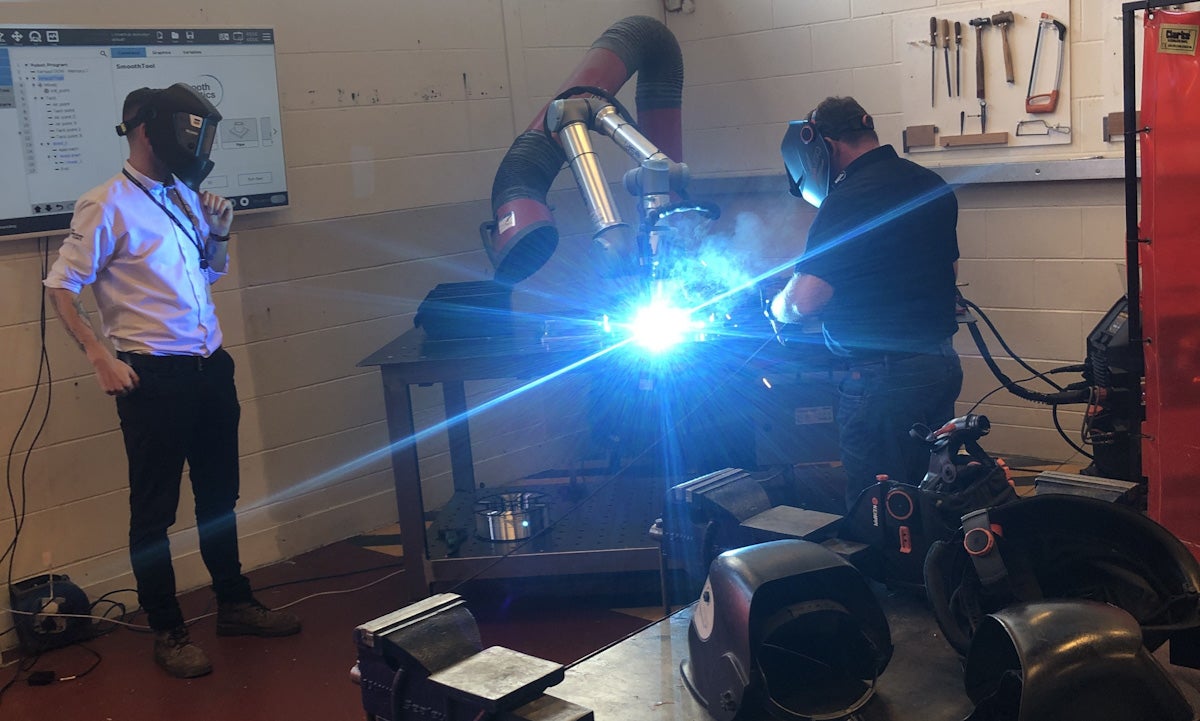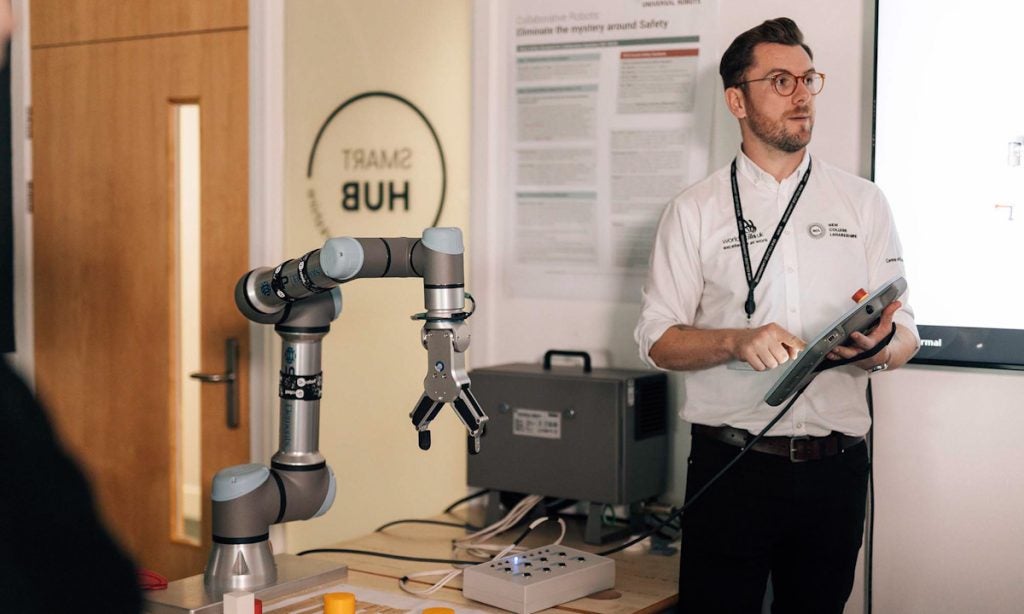
With productivity restricted by shortages of talent and skills across multiple industries worldwide, investments in robotics are helping to address business requirements. These advancements and impacts in robotics underscore the broader theme of how strategic capital investment in technology and automation can drive significant productivity gains, positioning businesses for sustainable growth and economic resilience.
Use cases in Scotland show that far from replacing human workers, deploying robots also creates jobs in the local economy. Supportive institutions such as Smart Hub Lanarkshire are working to extend robotics opportunities to businesses in the region, boosting productivity and driving economic growth.
Home to a robust business network and leading academic institutions, Scotland has all the tools to become a leading global centre for robotics in the years ahead.
The need for robots in a changing workforce
GlobalData predicts that the robotics industry will be worth $217.6bn by 2030, up from $76.1bn in 2023. This compound annual growth rate of 14% will be driven by rising sales of industrial and service robots, which are becoming increasingly effective when incorporating AI and the Internet of Things.
Additionally, demographic change means that, in the future, fewer younger workers will be available to support the needs of a much larger and older population.
“The available workforce over the next decade will struggle to meet the needs of the jobs that currently are undertaken by humans,” notes Elaine Morrison, director of productivity at Scottish Enterprise. “Thinking about how people can deliver their business differently will be hugely important for the future. Productivity is everything – by targeting your investment towards areas such as technology, automation or R&D, you define your own success.
“At the same time, you reduce the effects that factors outside your control have on your business. Productivity puts your business in control of its destiny – when it is targeted at productivity, capital investment allows you to step away from the competition, win profitable customers, create high-value jobs, and achieve sustainable growth. By focusing on productivity, your business gains deep insights into return on investment [ROI], and productivity becomes ingrained in your strategic decision making. It sets up your business for a virtuous cycle of success.”
To meet growing demand, small to medium enterprises across Scotland are turning to collaborative robots (cobots) to automate processes, particularly repetitive or strenuous tasks. Set up with funding from the Scottish Government and support from Scottish Enterprise, the Smart Hub at New College Lanarkshire enables the education of robotics, loaning businesses equipment to encourage trials, as well as providing access to industry experts. The Smart Hub also now receives funding from the UK Government to educate on robotics and further industrial uses.
Using cobots to drive productivity in Scotland
As with AI, cobots are enhancing the capabilities of the human workforce. Cobots already have a range of applications across Scotland, from electronics companies employing robotics to support welding and machine tending, to an ice cream business using the tech to create different shapes for its products.
“Cobots can be a huge advantage,” explains Ryan Sheridan, cobot and automation advisor at Smart Hub Lanarkshire. “The developments in Industry 4.0 tech means that robots have the flexibility and automation that really suit the market.”
Implementing these robots typically requires hiring staff rather than losing them – a business cannot grow from tech alone.
“There is a local company in Lanarkshire that purchased three collaborative robots but employed around 12 new staff at the same time,” notes Sheridan. “It was the combination of both factors that allowed the business to grow.”
The Smart Hub recognises that the skills gap must also be addressed for the workforce to get the most out of the robotics transformation.
“We will be developing qualifications and apprenticeships that upskill people,” says Sheridan. “This equipment isn’t going away, it is something that everyone will need to understand because it will be in most businesses. There really isn’t a limit to the tech in terms of where it can be deployed.”

Returns on investment for robotics
One of the main barriers to the industrial use of robotics is the upfront investment required. However, some use cases in Scotland have delivered an ROI within six to nine months from the extra productivity.
“One company in Glasgow had an ROI in 20 weeks,” says Sheridan. “They were then able to introduce something like a 10% or 15% wage increase for staff – and this was in 2022, a really difficult financial time. They saw such a push in productivity that they were able to do this – and even started selling into China.”
Notably, Scotland’s strong manufacturing industry could experience a substantial boost from investment in robotics. The region currently has more than 9,300 manufacturing businesses, which employ more than 173,000 people. Within this total, 7% of businesses are based in Lanarkshire, where being close to the Smart Hub is proving advantageous.
“Scotland’s manufacturing industry currently provides over half of our exports, and we have seen an increasing number of start-up companies evolve,” adds Morrison. “We have a policy landscape that is supportive and supports companies to invest in opportunities for the future.”
Crucial to the development of robotics across all industries in Scotland is the available expertise in automation and software. With AI and machine learning providing new ways to advance robotics, Scotland’s technical hubs at universities in Glasgow and Edinburgh are undertaking essential research with numerous real-world applications.
Along with the Smart Hub, the National Robotarium at Heriot-Watt University in Edinburgh is developing a reputation as a key location for driving innovation and developing robotics use across a diverse range of industries. Institutions such as these are only expected to become more important in developing the solutions needed to address future industry demand. This need is recognised by the Scottish Government, which recently announced a commitment to work with organisations such as the Robotarium to open new opportunities for the Scottish tech companies that hold the most promise for growth.
“Scotland is doing particularly well because we have a series of projects such as the Smart Hub, which are investing in and educating companies and apprentices,” says Sheridan. “It doesn’t matter where you are geographically, there are hubs nearby where you can come and learn, get support on your business, find out about grants – and it is all completely free.”
Creating new opportunities for robotics in Scotland
A key part of the Smart Hub proposition is educating and supporting companies through their robotics journey. The hub can even lend cobots to businesses for free so they can understand how they operate and build trust in the tech before making the crucial investment decision.
Alongside these innovation hubs, businesses in Scotland can benefit from a range of funding opportunities for robotics. With grants on offer from European, Scottish and UK institutions, companies of all scales seeking to integrate robotics can find ways to advance their ambitions in Scotland.
“There are a number of early start-up initiatives available in robotics,” notes Sheridan. “It is important that companies can access these facilities early on because this kind of equipment could transform the shape of their business from the very beginning.”
Morrison believes this supportive business network sets Scotland apart from other regions around the world. “We are a relatively small country compared with others, but we are very well-connected,” she notes. “We know one another and what is on offer, making it easy to invest and grow your business from here.”
Smart Hub Lanarkshire is just one example where close collaboration between the government, the private sector and academia is driving innovation in Scotland. The support available for businesses will continue to put the country ahead of the curve as automation accelerates. Scottish Enterprise has supported other specialists in robotics and automation that could one day become household names – such as Leap Automation, HonuWorx, Metacarpal Prosthetics, Ossur and Direct Soccer.
There is a growing belief that this promising network could soon develop into a specialist cluster for robotics, learning from other clusters such as fintech, which have already demonstrated what can be achieved through a combination of expertise, support and collaboration.
To learn more about reasons to invest in Scotland, download the free report below.





